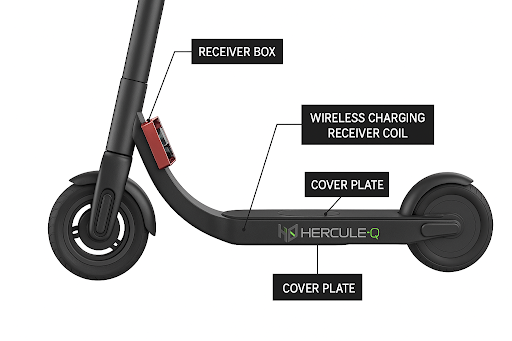

Examining how wireless charging will influence the future of transportation.
As cities move toward a cleaner and more sustainable future, it’s critical that innovation in transportation does not leave anyone behind. While E-bikes, E-scooters, and other micromobility options have become popular for their affordability and convenience, many low-income and underserved communities still lack reliable access to these solutions. To truly achieve equitable mobility, infrastructure must be designed with inclusivity in mind.
Traditional micromobility charging systems rely heavily on plug-in stations or manual battery swaps. These methods are expensive, labor-intensive, and often concentrated in higher-income or high-traffic neighborhoods. This leaves underserved communities without the same level of access, perpetuating transportation inequities. Without infrastructure that is safe, reliable, and convenient, residents in these areas are less likely to adopt clean mobility options.
Wireless charging presents a transformative opportunity to bridge this gap. By offering tamper-resistant, weatherproof, and touch-free stations, HerculE-Q’s technology enables micromobility vehicles to charge seamlessly in public and community spaces. Unlike plug-in systems that are prone to vandalism or misuse, wireless infrastructure is low-profile and more durable—making it well-suited for deployment in neighborhoods where traditional solutions have struggled. For residents, this means greater convenience, affordability, and reliability. Instead of worrying about carrying chargers or finding outlets, users can simply park and charge, ensuring their vehicles are always ready for essential trips to work, school, or healthcare facilities.
Delivering equitable mobility requires collaboration. By working with municipalities, community organizations, and clean energy programs, HerculE-Q aims to deploy charging infrastructure in neighborhoods historically left out of transportation investments. These partnerships will ensure that residents not only gain access to micromobility options but also benefit from the economic opportunities created through job training, system maintenance, and workforce development.
Equitable access to clean mobility is about more than convenience—it’s about economic empowerment, environmental justice, and community resilience. By expanding wireless charging into underserved neighborhoods, we can reduce car dependency, lower household transportation costs, and contribute to healthier, more sustainable cities. At HerculE-Q, our mission is to make sure the transition to sustainable transportation is inclusive and accessible to all, not just those in well-served areas. Because when mobility becomes equitable, everyone moves forward.